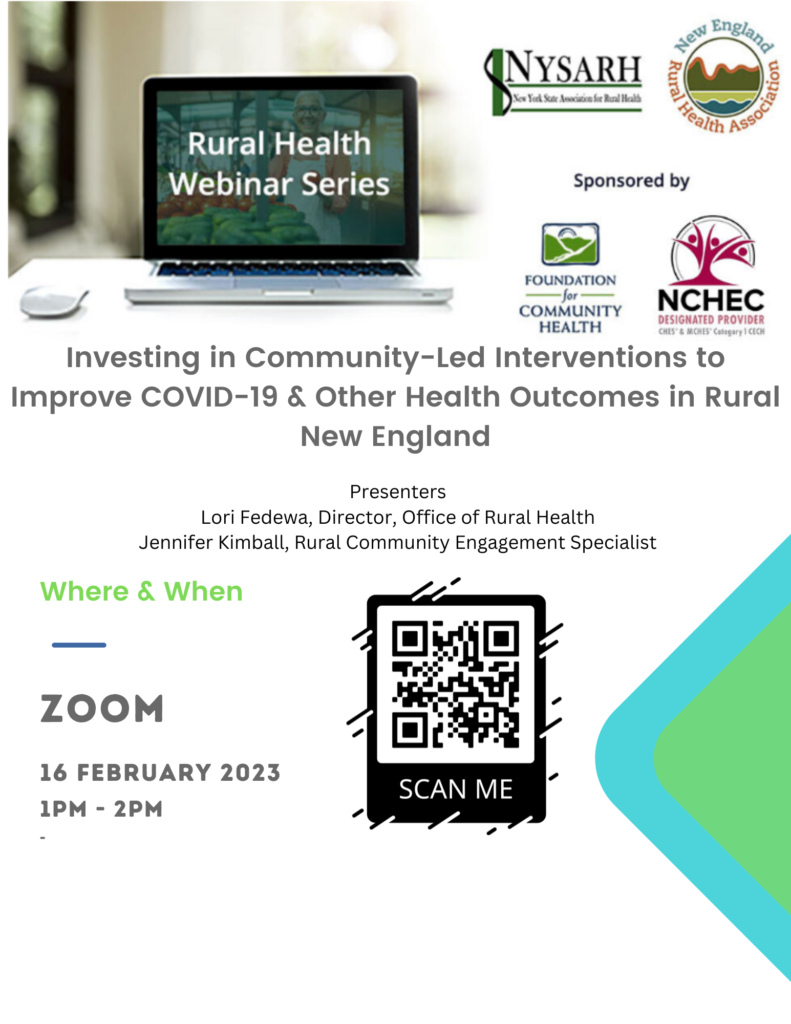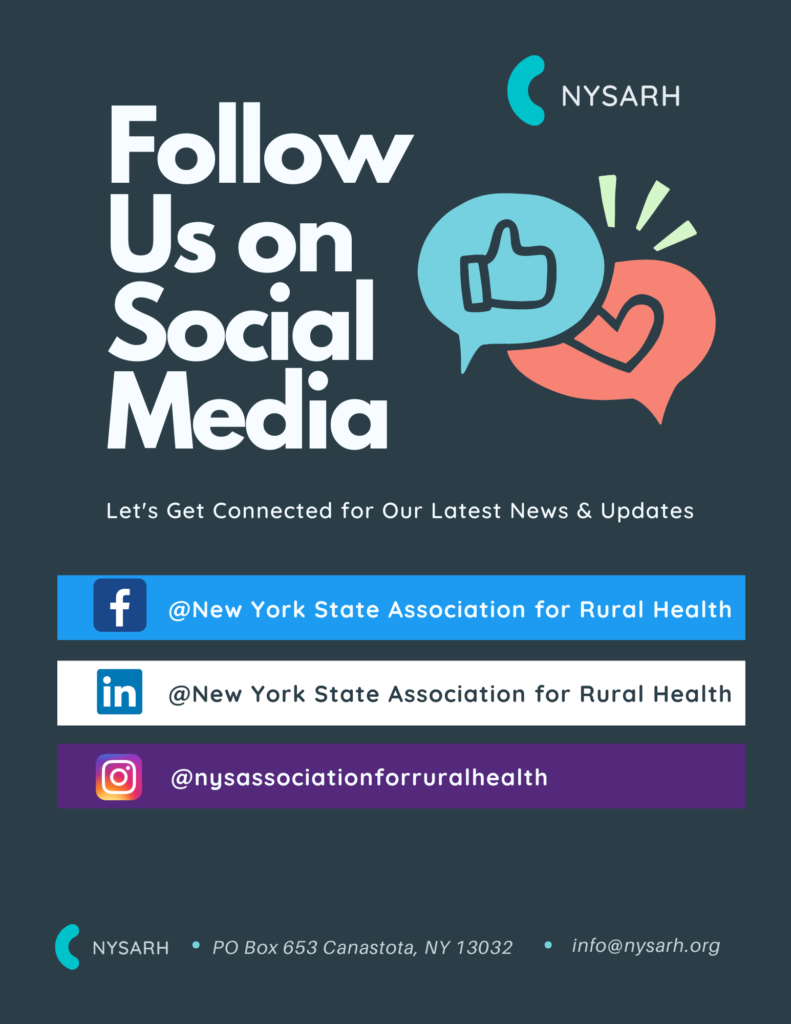NYSARH Newsletter
Winter 2023
Working to preserve and improve health and human services in rural New York State.
December 2022 - Feburary 2023
In this Issue
2022 Rural Health Award Recipients
Outstanding Rural Health Program of the Year Award
St. Lawrence Health Clinical and Rural Health Department
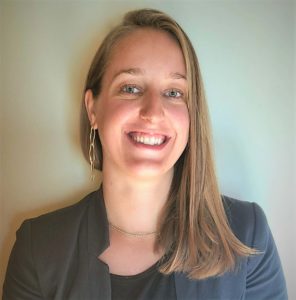
St. Lawrence Health (SLH) Clinical and Rural Health Research Department was founded in 2015 with the goal of providing access to state-of-the-art health care options to NorthCountry residents. Prior to this, residents of St. Lawrence County had to travel to Syracuse, Rochester, or Burlington – all at least two hours away – to access clinical trials to treat their medical conditions. This places an unfair burden on rural residents to travel long distances (often with a family caregiver), to bear the costs of travel and lodging, and to leave their local support networks at the times they need them most. By establishing a Clinical and Rural Health Research Department in St. Lawrence County, they wanted to provide the best care close to home. SLH Clinical and Rural Health Research Department has been instrumental in bringing clinical studies and trials to St. Lawrence County’s rural population. These studies and trials have facilitated innovative approaches to medical treatment options for the community. SLHS Clinical and Rural Health Research Department provides inclusive educational opportunities through webinars, programing, and surveys. It provides support to local physicians to conduct clinical trials and collaborates with students and faculty SUNY Potsdam, Clarkson University, St. Lawrence University, and SUNY Canton. The impact that the SLH Clinical and Rural Health Research Department makes is exemplary and could be replicated to increase equitable access to advanced therapeutics in other rural communities.
Dr. Gary Ogden Rural Health Practitioner of the Year Award:
Dr. Sahi Karras
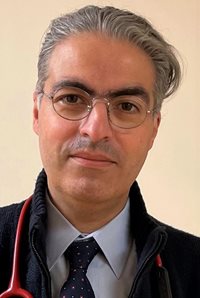
Dr. Sahi Karras has been selected as the winner of the 2022 Dr. Gary Ogden Rural Health Practitioner of the Year award. Zahi Kassas, MD, is a Pediatric Specialist in Wellsville, NY with over 27 years of experience in pediatrics and internal medicine. He graduated from Amer U. Beirut Medical School in 1994 and began his rural practice in Wellsville, NY, a small town in Allegany County, in 1998. Kassas’ Pediatrics’ mission is “to provide children in our community with the best medical care possible, and to do so with a warm, caring, and enthusiastic feel. It is our goal to provide the best quality of care.” Dr. Kassas embodies this mission. He can be found in his office at all hours of the day or night, including weekdays, weekends, and holidays, caring for children. Every family receives his personal cell-phone number to call with questions or concerns 24-hours a day, 365-days a year. When Dr. Kassas walks into an exam room, his gentle demeanor, bright smile, and compassion is not only a
habit, but is the true essence of an Outstanding Rural Health Practitioner.
Outstanding Rural Health Program of the Year Award:
Dr. Lennart Johns
Dr. Lennart Johns, Dean of the Lewis School of Health Sciences, grew up in a rural community and understands the healthcare needs and challenges inherent in rural settings.Under his leadership, Clarkson University has diligently worked through the
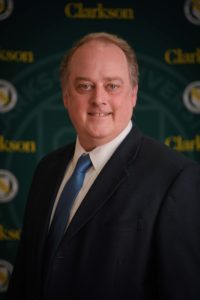 process of becoming a NYS Course Sponsor for EMS Educational Programs and is currently offering classes. This new program enhances emergency medical services instruction using state-of-the-art resources including a simulation lab, and separate practical skills rooms. Students are exposed to realistic, practical training experiences preparing them to address the needs of each patient at the point of care while strengthening the local rural health system by engaging with local hospitals, EMS departments, and first responders. Dr. John’s support has been instrumental from the start of the emergency medical program at Clarkson. Moving forward the program, he will work closely with local hospitals and EMS agencies to bolster the rural health care system in St. Lawrence County. The addition of an emergency medical technician training program is a necessary offering and an exciting opportunity that aligns with the Lewis School of Health Science’s mission to enhance the healthcare system in rural communities and improve the quality of life for all North Country residents.
process of becoming a NYS Course Sponsor for EMS Educational Programs and is currently offering classes. This new program enhances emergency medical services instruction using state-of-the-art resources including a simulation lab, and separate practical skills rooms. Students are exposed to realistic, practical training experiences preparing them to address the needs of each patient at the point of care while strengthening the local rural health system by engaging with local hospitals, EMS departments, and first responders. Dr. John’s support has been instrumental from the start of the emergency medical program at Clarkson. Moving forward the program, he will work closely with local hospitals and EMS agencies to bolster the rural health care system in St. Lawrence County. The addition of an emergency medical technician training program is a necessary offering and an exciting opportunity that aligns with the Lewis School of Health Science’s mission to enhance the healthcare system in rural communities and improve the quality of life for all North Country residents.Senator Kirsten Gillibrand Announces Over $130 Million In Federal Funding To Help Assist And Revitalize New York’s Overburdened Health Care System
Including:
$47 million for Area Health Education Centers (AHEC): This funding will help support AHECs across the country, including the 9 across New York State. More than 6 million New Yorkers live in primary care Health Professional Shortage Areas (HPSAs); this figure exceeds the primary care HPSA populations of 46 other states. Local New York AHECs help address workforce shortages by introducing high school students to careers in health care and working with local nursing, medical, and physician assistant schools to provide students an opportunity to understand the social and cultural factors that influence an individual’s overall health and access to quality care.
New York State Advocacy
The NYSARH Policy Committee met with Deputy Secretary of Health Angela Profeta in Governor Hochul’s office and Commissioner Mary Bassett during the fall to request that the Executive Budget include increased funding for rural health programs. Unfortunately, flat funding of $9.4 million was included, so now we move to speaking with legislators. Please share our talking points with you NYS Senator and Assembly Member.
Angela Profeta in Governor Hochul’s office and Commissioner Mary Bassett during the fall to request that the Executive Budget include increased funding for rural health programs. Unfortunately, flat funding of $9.4 million was included, so now we move to speaking with legislators. Please share our talking points with you NYS Senator and Assembly Member.
Why do we need an increase in Rural Health Program funding?
- There are health disparities correlated with rurality; this is a health equity issue
- The requested funding will improve access to and the quality of rural healthcare
- Rural hospitals and networks are drivers for rural economic development
- Rural health programs foster multi-sector collaboration and problem-solving
Student Intern
Ednerdine Simon is interning with NYSARH from the University at Buffalo School of Public Health and Health Professions. She contributes the following regarding the Social Determinants of Health:
Many articles on the Rural Health Information Hub (RHIHub) state that Rural communities face many challenges regarding basic human needs. Those challenges create many barriers for rural residents because it negatively impacts their social determinants of health (SDOH). For instance, lack of access to healthcare. Some rural residents worry about their financial means to pay for services, transportation to services (long distance), and the ability to take paid time off of work to use such services, trusting their healthcare providers and confidence that they will receive quality care. In addition, some rural residents and households are food insecure, meaning they cannot rely on access to sufficient affordable and nutritious food at all times, increasing the risk of poor health outcomes. According to the 2017 United States Department of Agriculture Economic Research Service (USDA-ERS), food insecurity is strongly associated with chronic disease and poor health, disproportionately affecting rural populations. Long-term food insecurity can affect learning, development, productivity, physical and mental health, and family life. So, to improve their well-being, these needs must be met through equity and by providing them with the resources they need.
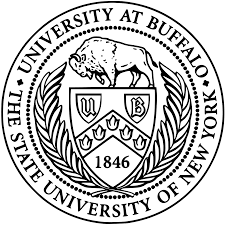
NYSARH Member Spotlight
Fort Drum Regional Health Planning Organization is a leader in health care delivery systems and the allocation of resources to address community health needs and improve health outcomes. With a mission to work to strengthen the System for Health for all individuals living in Jefferson, Lewis and St. Lawrence counties — civilians and soldiers alike.
The organization has made a tremendous impact and has established a reputation for excellence. The dedicated team of professionals at Fort Drum Regional Health Planning Organization is dedicated to engaging all aspects of the community to promote health and wellness, prevent illness and injury, and provide the highest quality care when and where necessary. Their tireless efforts have resulted in numerous grants enabling FDRHPO to establish STOP THE BLEED® community training program. Twenty-three instructors were recruited, and 102 community members have been trained in the life/limb-saving STOP THE BLEED® technique since May 2022. Their innovative approach and unwavering commitment to implementing planning strategies to identify and assess rural health challenges has made a lasting difference and has set a high bar for others to follow. They are constantly pushing boundaries and finding new ways to make a positive impact. We are proud to be associated with Fort Drum Regional Health Planning Organization and look forward to the continued impact they will make in the future.
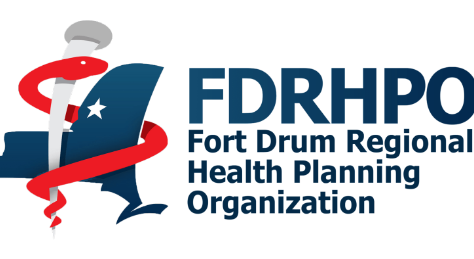
Thanks to Keynote Sponsors
On behalf of NYSARH, we would like to extend a heartfelt thank you for your generous support. Your sponsorship has been instrumental in making NYSARH rural health initiatives a huge success, and we could not have done it without you. Your support means so much to us, and we are grateful to have partners like you who share our vision and values. We would like to take this opportunity to recognize your generosity and dedication. Your investment in NYSARH is a testament to your commitment to making a difference, and we are honored to have you as a sponsor. Once again, thank you from the bottom of our hearts. We look forward to continuing our partnership and making a positive impact together


NYSARH News
Welcome to Janiya Donson, new AmeriCorps VISTA Member assigned to NYSARH. Her diverse background and experiences will bring fresh perspectives and ideas to the group. It is believed that her contributions will greatly enhance the team’s ability to reach their goals and drive success. We are eager to collaborate with and support her as she settles in and becomes an integral part of the organization. Everyone looks forward to working together to make a positive impact.
Janiya Donson joined NYSARH as the Communications and Development Specialist in November 2022 and will serve through the end of October 2023. She recently graduated in the Fall of 2021 with a B.S. in Public Health and a minor in Communications. Janiya primarily serves on the Membership and Education Committees, creating the monthly membership reports, running the NYSARH/NERHA Rural Health Webinar Series, running NYSARH’s social media accounts, and writing NYSARH’s Quarterly Newsletter. She also conducts several membership outreach efforts and assists in website updates along with serving on the 2023 Public Health Partnership Conference planning committee.
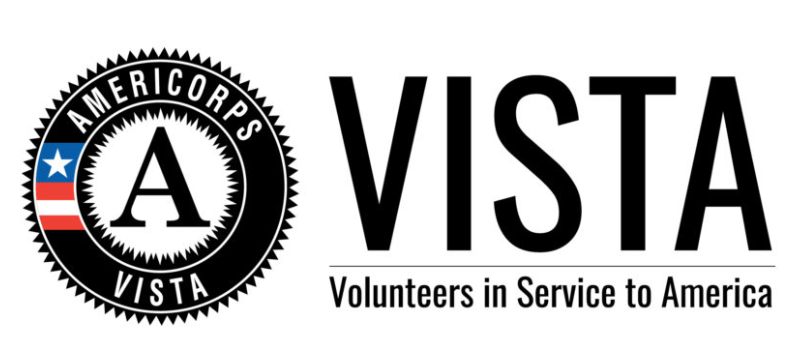
Making Multi-Cancer Early Detection Possible in Rural Communities
Whitney Jones, MD, Senior Medical Director, Medical Affairs, GRAIL
It’s no secre t that rural areas face numerous challenges accessing cancer care. Research shows that cancer is screened for less regularly, detected at later stages and has a higher mortality rate in rural areas compared to the rest of the country.
t that rural areas face numerous challenges accessing cancer care. Research shows that cancer is screened for less regularly, detected at later stages and has a higher mortality rate in rural areas compared to the rest of the country.
Fortunately, promising new cancer screening technologies are making it possible to address this disparity. Known as multi-cancer early detection (MCED), it is now possible to use a blood draw to identify the DNA signals that tumors shed into the blood as they grow. These tests work as a complement to existing single cancer screening tests, expanding the number of cancers for which we are able to screen.
Current cancer screenings exist for only five types of cancer– cervical, colorectal, prostate,breast and lung. And from those screenings, we know that the sooner the cancers are found,the better. By detecting more types of cancer early, we would be able to extend the benefits of early detection to more people and lead to better outcomes.
For rural America, especially rural New York, being able to access MCED tests could be a game changer. Further, extending the benefits of early detection to more cancers and more people, especially for those most at risk, is something we should all be able to agree on. Fortunately, a large and growing group of bipartisan policymakers and cancer advocacy leaders agree, and are working hard to keep the needs of rural Americans at-risk of cancer front of mind.
Upcoming Events
Funding Opportunities
The Environmental Justice Collaborative Problem-Solving Cooperative Agreement Program:
The Environmental Justice Collaborative Problem-Solving (EJCPS) Cooperative Agreement Program provides financial assistance to eligible organizations working to address local environmental or public health issues in their communities. The program assists recipients in building collaborative partnerships with other stakeholders (e.g., local businesses and industry, local government, medical service providers, academia, etc.) to develop solutions to environmental or public health issue(s) at the community level.
Tribal Infection Control Officers and Health Officials Training Scholarships
NIHB is excited to provide the opportunity to assist Tribal Infection Control Officers and Health Officials with completing courses to expand their knowledge of infection control and improve their ability to prevent infections in Tribal communities. We believe providing the scholarship opportunity will enhance the important work Tribal healthcare workers do for their Tribal health system . NIHB is accepting scholarship applications on a rolling basis.
Emergency Rural Health Care Grant Program
This program is designed to help broaden access to COVID-19 testing and vaccines, rural healthcare services, and food assistance through food banks and food distribution facilities. This program offers two tracks of funding:
- Track One: Recovery Grants provide immediate relief to address the economic conditions arising from the COVID-19 emergency. Grant funds must be used in relation to the COVID-19 pandemic and to support immediate health care needs, to help prepare for a future pandemic event, or to increase access to quality health care services and improve community health outcomes. Grant awards range from $25,000 – $1 million.
- Track Two: Impact Grants advance ideas and solutions to solve regional rural health care problems to support the long-term sustainability of rural health care. Long-term sustainability is defined as “improved health outcomes, improved access to quality health care, and creating and maintaining sustainable economic development for small communities.” Grant funds must be used in relation to the COVID-19 pandemic. Grant awards range from $5 million – $10 million.
MEMBER LIST
We would like to thank each member who works diligently to make NYSARH the state’s strongest proponent for rural healthcare.
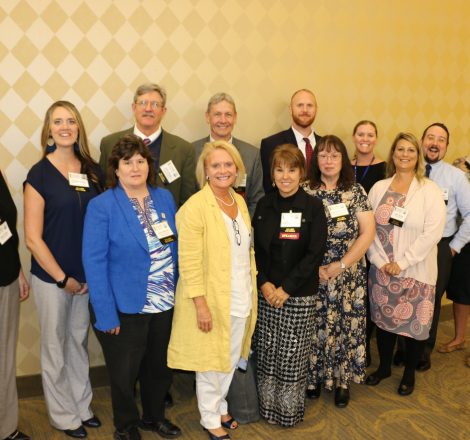
Organization-based Members
- Adirondack Health
- Adirondack Health Institute
- Ardent Solutions
- Brooks TLC Hospital System, Inc.
- Catskill Hudson Area Health Education Center
- Care Compass Network
- Cayuga County Community Health Network, Inc.
- Chenango Health Network, Inc.
- Common Ground Health
- Community Health Center of North Country
- Delaware Co Rural Healthcare Alliance
- Ellenville Regional Hospital
- Finger Lakes Community Health
- Finger Lakes IPA
- Fort Drum Regional Health Planning Organization
- Foundation for Community Health
- Genesee County Health Department
- Genesee Valley Health Partnership
- Healthy Community Alliance, Inc.
- Health Workforce New York
- Lake Plains Community Care Network
- M.S. Hall & Associates, LLC
- Madison County Rural Health Council, Inc.
- North Country Family Health Center, Inc.
- North Country Healthy Heart Network
- North Country Prenatal Perinatal Council, Inc.
- Oneida Health Foundation
- Opportunities for Otsego, Inc.
- Prevention Network
- Rural Health Education Network of Schoharie, Ostego, and Montgomery Counties
- Rural Health Network of South Central New York
- Rural Outreach Center
- S2AY Rural Health Network
- Seven Valleys Health Coalition
- Southern Tier Health Care System, Inc.
- Steuben County Rural Health Network
- St. Lawrence County Health Initiative, Inc.
- Sullivan County Public Health Services
- SUNY Upstate Medical University College of Nursing
- The Chautauqua Center
- The Healthcare Consortium
- The Resource Center
- Universal Primary Care
- Upper Hudson Planned Parenthood
- Upstate Family Health Center, Inc.
- UR/St. James Hospital
- Wayen County Rural Health Network
- Wyoming County Community Health System
Organization-based Members
| UR-St. James Hospital |
| President and Chief Executive Officer |
| Coalition of New York State Alzheimer’s Association Chapters |
| Kinney Drugs |
| Clinton County Health Department |
| The Compliance Team, Inc. |
| Planned Parenthood of Central and Western New York |
| Care Compass Network |
| Rural Health Education Network of Schoharie, Otsego, Montgomery |
| Ira Davenport Memorial Hospital/ArnotHealth |
| Sullivan County Public Health Services |
| Upper Hudson Planned Parenthood |
| North Country Family Health Center, Inc. |
| Adirondack Health |
| Adirondack Health Institute |
| The Chautauqua Center |
| M.S. Hall & Associates, LLC |
| Common Ground Health |
| STCHCN – Universal Primary Care |
| Onondaga Council on Alcoholism & Addictions, Inc. d.b.a. Prevention Network |
| Jones Memorial Hospital |
| North Country Prenatal Perinatal Council, Inc. |
| Upstate Family Health Center, Inc. |
| St. Lawrence County Health Initiative, Inc. |
| The Healthcare Consortium |
| Ardent Solutions |
| Rural Health Network of SCNY |
| Healthy Community Alliance, Inc. |
| Fort Drum Regional Health Planning Organization |
| Association on Aging in New York, Inc |
| Central New York Area Health Education Center |
| Finger Lakes IPA, Inc |
| Human Services Coalition of Tompkins County |
| North Country Healthy Heart Network |
| Southern Tier Health Care System, Inc. |
| Genesee County Health Department |
| Chenango Health Network, Inc |
| Northern AHEC |
| Cayuga County Community Health Network, Inc. |
| Seven Valleys Health Coalition |
| Lake Plains Community Care Network |
| Greene County Rural Health Network |
| Le Moyne College Department of Physician Assistant Studies |
| Genesee Valley Health Partnership |
| Catskill Hudson Area Health Education Center |
| SUNY Upstate Medical University College of Nursing |
| Foundation for Community Health |
| Madison County Rural Health Council Inc |
| Wayen County Rural Health Network |
Individual Members
Brad | West |
Tara | Jewett |
Joan | Carl |
Christine | Veschusio |
Lenn | Johns |
Douglas | Wildermuth |
Alex | Brooks |
Kimberly | Bank |
Marela | Fiacco |
John | Salo |
Steven | Kroll |
Karin | Pantel |
Janice | Shirley |
Rajiv | Pant |
David | Yens |
Nicole | Rouhana |
Richard | Terry |
Ann | Abdella |
Leanna | Cleveland |
Carrie | Roseamelia |
James | Skiff |
Ali | Coate |
Virginia | Bough |
Sara Wall | Bollinger |
Mandy | Qualls |
Helen | Evans |
Catherine | Paci |
Kate | Downes |
Lisa | Berard |
Sarah | Gilbert |
Alicia | Ekstrom |
Melissa | Sumpter |
Nikki | Acala |
Angela | Langdon |
Anne | Garno |
Meliss | Pennise |
Tracy | Moody |
Brandi | Jones |
Lucas | Sienk |
Matthew | Scollin |
Scott | Emery |
Jordan | Wood |
Jason | Allen |
Darci | Beiras |
Chris | Spicer |
Stacey | Richards |
Mary Jo | Marino |
Kathi | Lynch |
Summer | Wilber |
Student Members
Lovina | John |
Caitlyn | Knapp |
Abigail | Mosenthin |
Kyle | Sasso |
Lee Ann | Hubbert |
Mary | Chesna |
Elana | Sitnik |
Ella | James |
Maria | Scorzelli Webb |
Benjamin | Aldrich |
Become a Member
We invite you to join us through advocacy and by advancing initiatives that support a commitment to improving healthcare quality and access.

